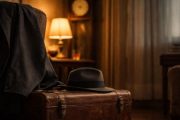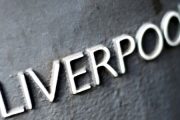Very soon the first major change took place in Solly’s life. Perhaps you think that it should be the second, after his father died. Not to Solly. This was big, very big, – and not a change for the better. It began when a long black car with darkened windows arrived at his store. Solly immediately knew who it was. As did everyone in the neighbourhood. It was “Big Barney”, aka Beryl Warshawsky, No one dared call him Beryl. Except perhaps his mother. Perhaps. To do so would be a big mistake A very big mistake. Out came Big Barney dressed in his traditional all-black outfit. Sunglasses, overcoat, fedora, suit, shirt and shoes – all black. And with a white tie. Of course. It provided a contrast. Entering the store smoking his ever-present cigar and with a confident air, he looked around and in a gravelly monotone voice proceeded to make Solly an offer. One that could not be refused. To do so would be unwise. Very unwise. Some of you may recall what happened to Yankel Silverstein, who used his newsstand on Ste. Catherine St. and Drummond as a front for his bookmaking activities. One day Big Barney “asked” Yankel to work for him. Yankel said no. That was very unwise. Next day his newsstand was hit by an errant truck and was flattened. While Yankel was still in it. Solly remembered. Big Barney told Solly it was his lucky day. From this day forward “Solly’s” would become a “front” for several of his “activities”. His business transactions. In exchange, said Big Barney, he would be fair and generous and allow Solly to keep 10% of the “take” – the profit generated.
Solly wasn’t sure if it was fair or even generous. What he did know was that he couldn’t say no. Which would be a mistake. A very big mistake. So from that day on, he became known as “Lucky Solly”. Just not exactly the kind of luck anyone wished for.
Soon there were nightly poker games in the back room of the store and it became the place to go in order to bet on the numbers racket. The basement became an “outlet” for swag – stolen stuff before it was “fenced”. As a result there were no longer any legitimate customers coming in. None. Well, that’s not exactly true. There was still Dutchy, though he could hardly be termed either “legitimate” or even a customer. Dutchy was a “moocher”, living off the generosity of others who felt sorry for him. Why was he called Dutchy? No one really knew. Some said it was because he immigrated from Holland. Others believed it was because he was once a salesman for Old Dutch cleanser. In any case he just appeared on the streets of Mile End many years ago and told everyone that his name was Dutchy. No last name. Just Dutchy. He was very short, with a ready smile under an ever-present fedora worn jauntily high on his forehead, and a rumpled -beyond- caring suit. The same one he wore every day.




